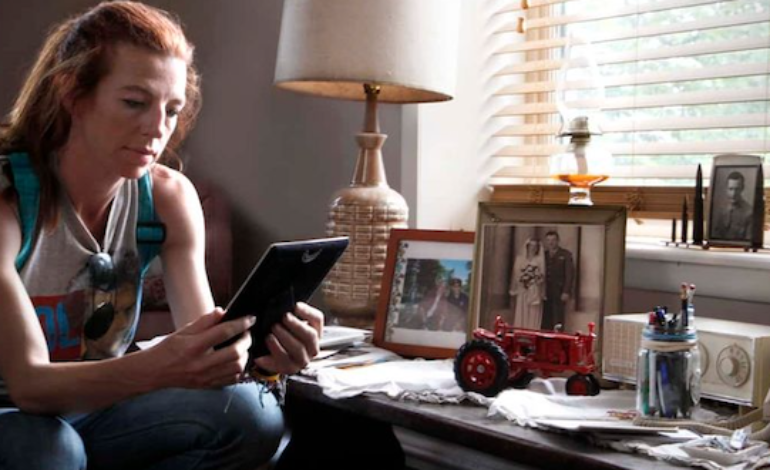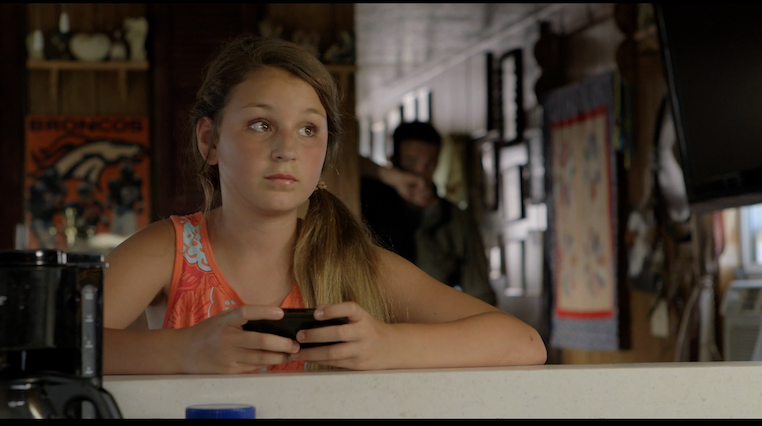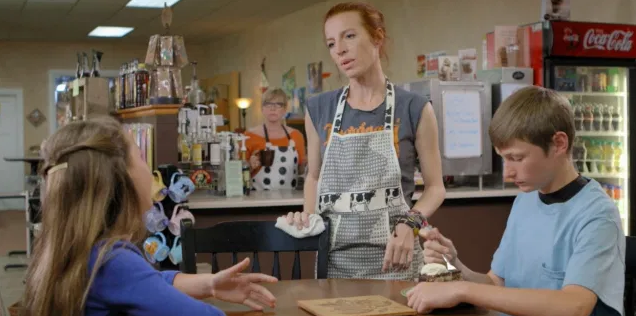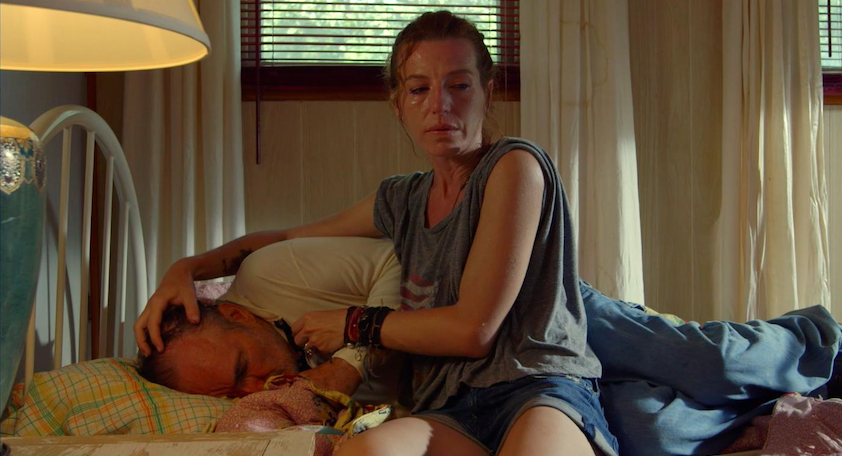

Two Ways Home (2020), directed by Ron Vignone (Say I Do, The Back Nine), and written by Courtney Kirkpatrick, Edward Kirkpatrick, and Tanna Frederick, with original screenplay by Richard Schinnow, follows Kathy (played by Tanna Frederick) a young woman living with bipolar disorder that gets in trouble with the law and ends up in jail for several years. Upon her release, she returns to the small town she grew up in to be with her family. While there, she struggles to care for her cantankerous grandfather (Tom Bower) and his dilapidated farmhouse, all while trying to reconcile with her estranged 12-year-old daughter, Cori (Rylie Behr).
The standout of this film was the cast, particularly the lead performances from Tanna Frederick (Hollywood Dreams, The M Word, Irene in Time) and Tom Bower (Die Hard 2, El Camino: A Breaking Bad Movie, Nixon) as her grandfather, Walter. Frederick was spectacular as Kathy, a woman living with bipolar disorder struggling to reconnect with her family. I felt she did a great job of balancing her character’s very clear good-nature and desire to reconnect with her family, with her tough exterior and rough, farm girl origins. You really feel that she grew up in this small town and you really feel her struggle with her bipolar disorder and her frustration with how her own family treats her. Speaking of, I admittedly don’t have much knowledge of bipolar disorders, but I felt that her bipolar disorder was written really tastefully. It didn’t feel exploitative and it wasn’t her defining characteristic, it was simply a part of her character.


I thought that Frederick and Bower not only had the best written relationship, but both actors had the most chemistry which really added a greater depth and heart to the film. Both actors were excellent together and you really feel that home-grown, tough love connection they have for each other. Speaking of, Tom Bower, who’s probably the most well known actor in the film, was excellent. Like Frederick, Bower brings to life Walter’s stubbornness really well that makes you believe why he would be at odds with but at the same time closest to Kathy. I also thought his mental illness was portrayed in a way that didn’t feel like it was talking down to the audience.
I thought overall the characters and the way they were written were some of the best parts of the script. I mentioned Kathy and her grandfather, but I also really responded to her relationship with her ex, Junior (Joel West) and the way their relationship evolved over the course of the film and climaxed in a very emotional scene between the two of them in a barn. I also really liked Kathy’s relationship with her parents and how her parents were left to take care of Cori when Kathy went to jail. Speaking of Cori, she’s unfortunately the character I have the most mixed feelings about her. I do think that she was performed really well by Rylie Behr (Chasing Gold, I Heart Shakey), however, the character was written to be too nasty and unnecessarily cruel. On the one hand, It makes narrative sense why Cori would be bitter towards Kathy and mad at her for missing the last three years of her life. But the way she talks to Kathy and even to her friend and this lady who hires Kathy is so unnecessarily cruel, that it’s one of the reasons that makes their ultimate resolution less satisfying or believable.


This leads me into the script. Overall, I thought the script was pretty strong. Most of the characters were very well written and the story had a nice slice of life feel to it that I think helped contribute to the narrative as we watch Kathy adjust back to being a mother and to small town life. I think there were really only a couple of narrative/scripting issues. The first, as I mentioned, being Cori’s unnecessary cruelness, which is just one part that makes the final resolution between the two feel very unearned. The second being is that there is never a scene in which Cori has a realization that maybe her mother isn’t so bad. Then, when Cori eventually gets in trouble, it isn’t Kathy that comes to her aid. So, when Cori is healing, it doesn’t really feel earned that it would then be Kathy whom she feels grateful for. The final glaring issue about the script comes when Junior witnesses a scene between Kathy and Walter, and it leads Junior to search through Walter’s home. But when he confronts Kathy about what he witnessed, he’s mad at Kathy, because it turns out he found something related to her. It was just very confusing considering he found something in the grandfather’s house, after witnessing a conversation in which Kathy was talking to Walter about his condition.
Unfortunately, I found the cinematography from Christopher C. Pearson to be somewhat flat. The lighting was very bland and there were little if any memorable shots, besides the scenic shots. Any shot of farmland or a wide-shot of a character walking outdoors was very beautiful. I think the editing from Ron Vignone, Kate Noonan, and Jorge Alarcon-Swaby was also very jarring and cuts would happen at very strange times, except for whenever there was a montage, when Kathy is taking her medication, or when Kathy’s bipolar disorder is visually represented. I thought the editing was very effective in those instances. The direction from Ron Vignone was decent. Though the camera direction was quite flat, I thought he did a good job with the blocking/staging, characters, and character relationships. I also thought the music choices were very good and that, coupled with the scenic shots, really helped create a nice and homely small town feel and atmosphere.


Verdict: 2.5 out of 5 Stars
Two Ways Home (2020) benefited mostly from the lead performances from Tanna Frederick and Tom Bower, as well as the writing for these characters and their respective relationship with each other. Kathy was an excellent protagonist and I felt the film did a great job of representing her mental disorder and her adjustment to normalcy. That being said, the direction, cinematography, and editing were all uneven at best and the ultimate resolution between Kathy and her daughter was by far the most unearned part of the film, which is a shame considering how well written the other characters and character relationships are.
